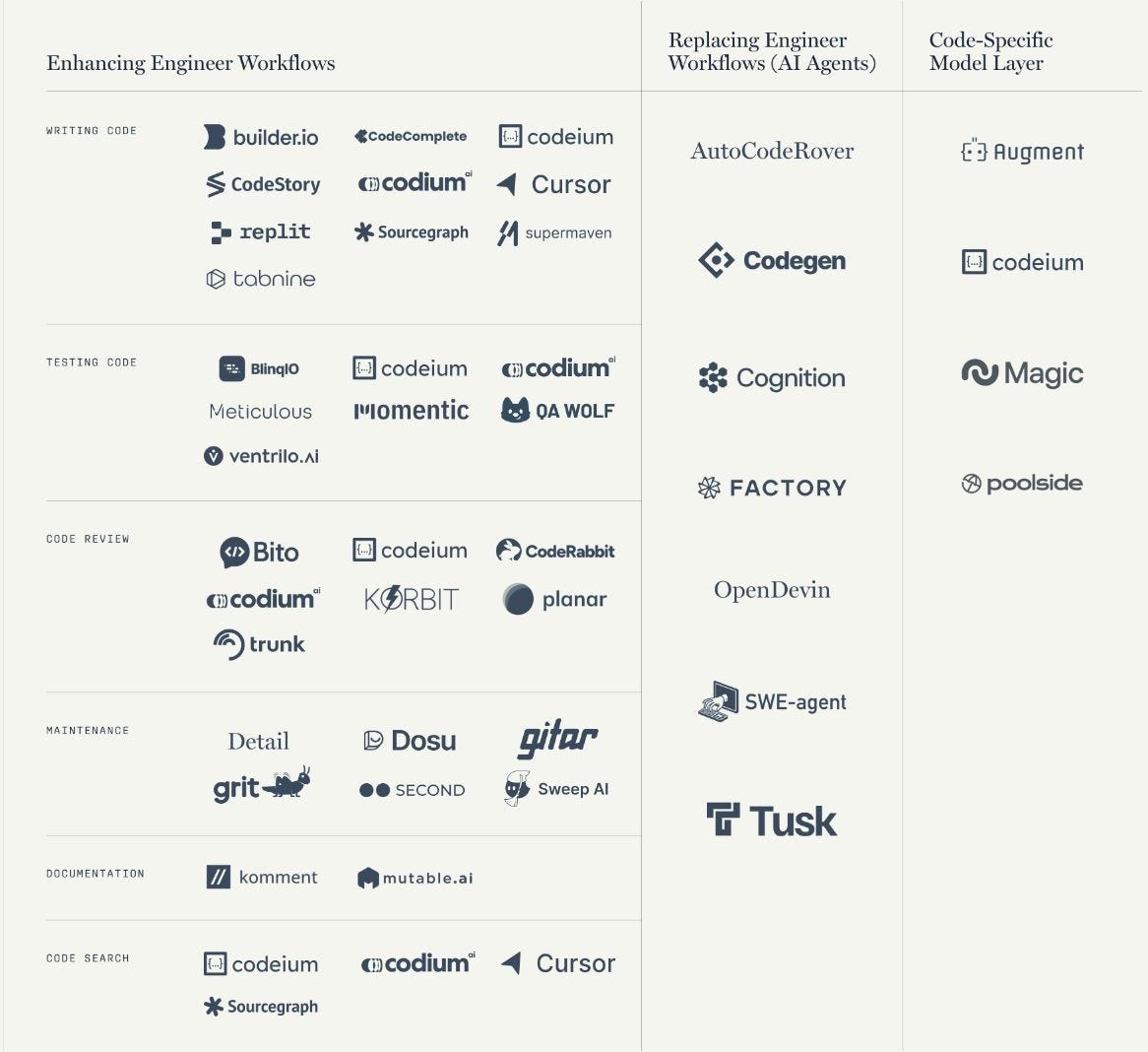AI Coding Funding Frenzy...Down Rounds Are (Delightfully) Down...Miami Losing VC Luster
Plus, the Safe Superintelligence dream team lands a cool billion
The Main Item
Investors Rush Into AI Coding Plays as Enterprise Adoption Soars
It’s been quite a week for generative AI coding startups.
As the industry returns from Burning Man and Labor Day, the action is heating up fast.
Two coding assistants that have developed their own foundation models, Codeium and Magic, were catapulted to unicorn status this week with large funding rounds from investors including General Catalyst, Sequoia, and Nat Friedman and Daniel Gross. Back in the spring, coding aid Augment landed big checks from Index and Lightspeed Venture Partners for its $277 million Series B round.
AI code editor Cursor, which can adapt over time to a developer’s coding style, landed $60 million in Series A funding from a16z, Thrive Capital, and OpenAI at the end of August. Cursor is integrated with Anthropic’s Claude 3.5 Sonnet model. Anthropic’s model consistently ranks the highest on various benchmarks for writing code. Three VCs not involved in the Cursor round told me that impressive capabilities of the combo stood out.
Founders are now aiming to build more sophisticated coding agents that can work across platforms to solve complex issues. Replit, whose “Core” subscribers pay $10 a month, on Thursday launched its latest agent, which the company says can write code, build developer databases, and deploy software based on plain English prompts.
Another new company, Honeycomb, operates multiple agents that are fine-tuned for different developer tasks, like bug fixes or code-testing, and can integrate workflows across systems like GitHub and Jira. The company is in the final stretch of Y Combinator’s Summer ’24 session, and this week landed itself at the top of the SWE-bench leaderboard, which measures how accurately a model can solve real-world software issues on GitHub.
The swirl of activity in recent weeks is testament to the sector being among the first in generative AI to demonstrate rapid enterprise adoption and substantial revenues. Unlike many other industries, where worries about accuracy, cost, and regulatory and legal compliance have slowed uptake, software developers are using AI coding tools en masse already.
“It's one of the few areas in enterprise where there is real value being shown,” one GP told me on background.
Are retail investors the LPs of the future?
Not everyone should invest in venture capital, but everyone should have the option to invest in venture capital.
Or so says the Fundrise Innovation Fund.
The pioneering fund has already raised $125m+ in its bid to level the playing field in one of the asset classes still largely untouched by the retail revolution.
With a portfolio of some of the biggest names in tech, the Fundrise Innovation Fund is making it easier than ever for anyone to “get in early.”
Carefully consider the investment material before investing, including objectives, risks, charges, and expenses. This and other information can be found in the Innovations Fund’s prospectus at Fundrise.com/Innovation. This is a paid advertisement.
A new survey conducted by GitHub published Wednesday found that 97% of the developers polled had already used an AI coding tool at work, whether or not their employer explicitly gave them permission to do so. Amazon’s Andy Jassy wrote in a recent LinkedIn post that the company has already seen an estimated “$260 million in annualized efficiency gains” after integrating its coding assistant “Q” into its workflows.
GitHub Copilot, which is owned by Microsoft, has already been a huge driver of revenue for the tech giant. CEO Satya Nadella noted on the company’s July earnings call that Copilot is now a “larger business than all of Github” was when Microsoft acquired it. Still, investors tell me that developers have enough frustrations with Copilot that they’re open to finding other solutions.
Tech giants and unicorn startups are sure to take a big chunk of the coding automation business. But niche tools that solve specific problems or operate as active agents, such as Factory’s “droids”—which can automate different parts of the code stack—have a lot of potential, investors said.
There is a lot to be proven yet, and many claims about coding capabilities are bound to prove premature, or worse. Cognition Lab’s agent product, named “Devin,” was highly touted after a demo this spring on its promise to be the world’s first “AI software engineer.” But momentum stalled when Devin was revealed to have cherry-picked its demos.
Many coding tasks by nature lend themselves well to algorithmic assistance, noted Bessemer’s Janelle Teng, since they involve problem-solving through a clear series of fixed steps.
“Many modern engineering teams spend only a fraction of their time writing net-new code since a large part of their responsibilities involve more mundane tasks such as maintaining, securing, refactoring, and testing code,” Teng told me over email. “We see immense possibilities for AI to make a big impact within these ‘mundane’ areas.”
For software developers, coding assistants stand as a sort of frenemy: very helpful for their work, but also potentially a threat to their jobs. Teng doesn’t think we’ll hit that threshold anytime soon for experienced devs, and the profession is split on whether AI assistants can code at developer-grade standards on their own. Issues like cybersecurity response or copyright enforcement will still require human oversight for years to come.
“We’re not going to eliminate the field by any stretch, but I do imagine for people who did coding boot camps and got $200,000 jobs, those jobs are going to be harder to come by,” an investor told me on background.
Greylock investor Corinne Riley put together a detailed market map for the space we’ve been using to keep track of all the different coding assistant startups and their use-cases. Check it out below:




